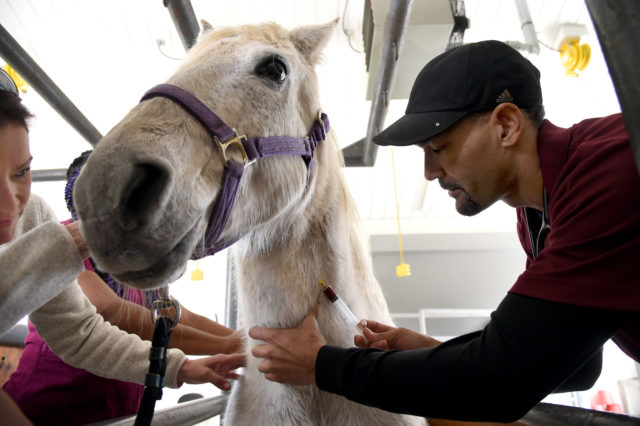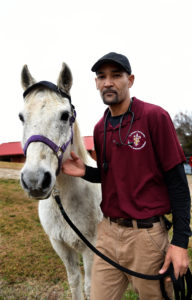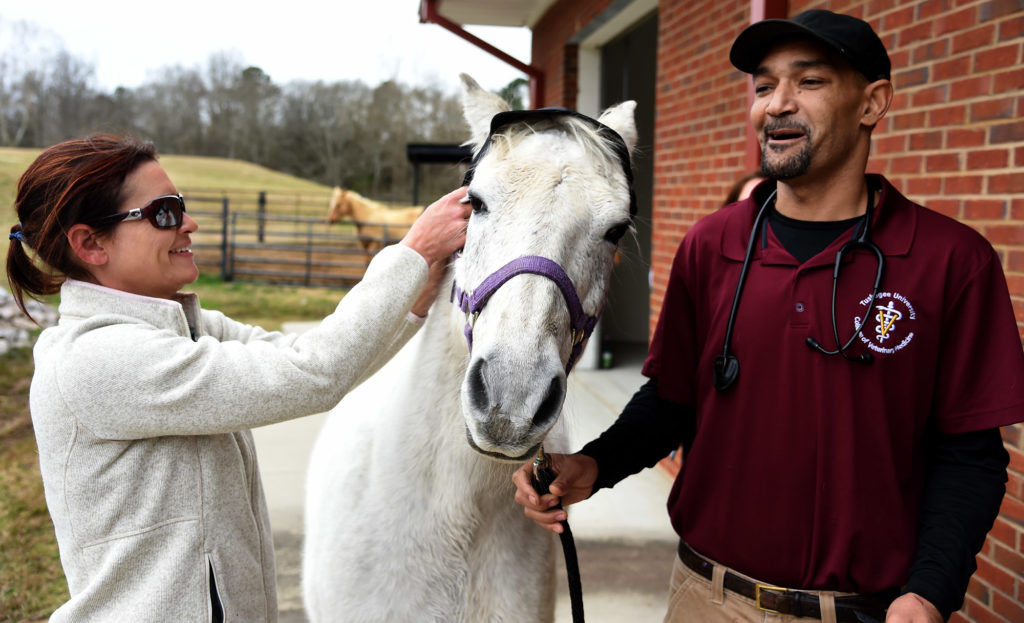
By Ameera Steward
The Birmingham Times

Russell Johnson always wanted to be a Tuskegee University graduate and a veterinarian. The 40-year-old gets to fulfill his wish for both in May, when he will graduate with a Doctor in Veterinary Medicine (DVM) degree from the Tuskegee University College of Veterinary Medicine (TUCVM).
“Tuskegee provided me and … a lot of other minorities, not just blacks … an opportunity,” he said. “Tuskegee has provided those of us that possibly couldn’t have gone anywhere else with an opportunity to become a veterinarian.”
Since childhood, Johnson knew what he wanted to become.
“When I was maybe 7, everybody in the neighborhood got a bike for Christmas; I got a Shetland pony,” said Johnson, who is originally from Enterprise, Ala. “We castrated our first pigs when I was itty bitty, and my father knew a lot about animals. He actually … graduated from Tuskegee … [and] also went to vet school for a while.”
Attending Tuskegee was a foregone conclusion for Johnson, whose mom, dad, uncle, and grandfather all attended the university.
“I’ve been going to Tuskegee my whole life. … That was all I knew,” he said. “From the time I was a little boy, … it’s always been Tuskegee and vet school.”
Johnson’s family moved to Fairfield when he was 12 years old. He graduated from Fairfield High School in 1996, enrolled at Alabama Agricultural and Mechanical University Mechanical after graduating from high school, and transferred to Tuskegee University in 1998. Johnson graduated from Tuskegee with a Bachelor of Science degree in animal science in 2002, but he didn’t apply to veterinary school.
In 2008, Johnson enrolled at Birmingham-Southern College, where he studied for a master’s degree in management; he did not complete the program. He also worked as a research assistant in the circadian rhythms research laboratory at the University of Alabama at Birmingham (UAB), where his boss encouraged him to pursue a master’s or neuroscience-related degree. While weighing his options for returning to school, Johnson spoke to his godbrother, who told him he should go to school for something he’s always wanted to be. So, Johnson decided to take a few classes to see if he “had the stamina.”
“I retook a few more classes and applied to vet school in 2014, but I did not get in; they told me I had some classes that had expired,” Johnson said.
Before he applied, the mother of his two children fell sick from cancer. After taking the classes he needed, he reapplied and got accepted in 2015. This left him with a difficult decision: stay with his children or leave for Tuskegee. After receiving a blessing from the mother of his children and help from his mother,
Comfort At Tuskegee

Johnson decided to follow his dream. In 2016, after his first year of vet school, the mother of his children passed away.
“It was extremely, extremely hard. … My situation was different,” said Johnson, whose children Jalyn and Russell III, were 6 and 2, respectively, at the time; they are now 10 and 6.
“It was heart-wrenching for me to make that decision. It was heart-wrenching for my kids not to be able to come with me [from Birmingham],” he said. “What do you do?”
With all this happening during his first year in veterinary school, Johnson found comfort at Tuskegee “from the support staff to the dean,” he said.
“Everybody constantly wanted to know if I was OK, those that knew. … I didn’t want anybody to say he’s going through this and he’s going through that. I didn’t want any crutches, … [and] no professors infringed on that. They allowed me to stand up, but if I tipped, they made sure I didn’t fall.
“Everybody offered, [asking], ‘Can I do anything to help you?’ … They were always there. … They provided me with access to the library to study all night long. The librarians were good to me. The two housekeeping ladies … [would] wake me up off the couch, make sure I was eating, … always check on me. … It was a family environment.”
Johnson said Tuskegee gave him a chance.
“I’m a young black man with two kids. We all have a history. … Every day of life hasn’t been pretty, and a lot of us that come from where I come from don’t get a chance. I was given a chance.”
Johnson’s goal is to have a mixed practice, working with both small and large animals. He’s also has considered working at Tuskegee, “… to get back some time with my kids, as well as further my career.”
Johnson appreciates Tuskegee because it allowed him to be who and what he wants to be.
“[The TUCVM] gives me the opportunity to be comfortable in large-animal medicine. … With equine, I have somebody to give me an extra nudge, an extra advantage, allow me to do things and learn things I might not get anywhere else,” he said. “I honestly feel like I wouldn’t have gotten that anywhere else.”




